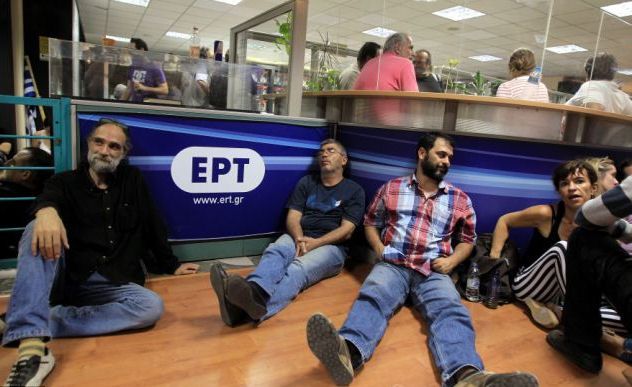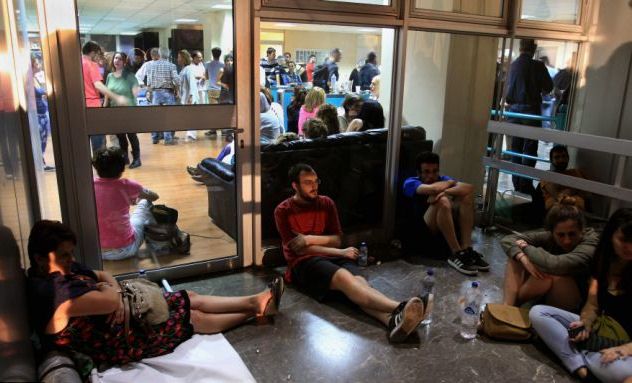Cash-strapped Greece has abruptly shut down all its state-run TV and radio stations as part of its cost-cutting drive demanded by the bailed-out country’s international creditors.
The dramatic move late last night will lead to the loss of some 2,500 jobs at the Hellenic Broadcasting Corporation, or ERT, which has been branded ‘a haven of waste'(Nothing compared with the waste at the BBC).
Thousands of protesters gathered outside the company’s headquarters north of Athens as journalists defied the order and continued a live Internet broadcast.



Nonetheless, government spokesman Simos Kedikoglou – a former state TV journalist – described ERT as a ‘haven of waste’ and TV and radio signals went dead early today.
‘ERT is a typical example of unique lack of transparency and incredible waste. And that ends today,’ Kedikoglou said.
‘It costs three to seven times as much as other TV stations and four to six times the personnel – for a very small viewership, about half that of an average private station.’
He said its 2,500 employees will be compensated and the company will reopen ‘as soon as possible’ with a smaller workforce.
Yesterday’s announcement did not make immediately clear how long that would take.


It is the first case of mass public sector layoffs in the recession-mired country, which has pledged to cut 15,000 state jobs by 2015 as part of its bailout commitments.
Debt-stifled Greece has depended on rescue loans from its European partners and the International Monetary Fund since May 2010.
In exchange, it imposed deeply resented income cuts and tax hikes, which exacerbated a crippling recession and forced tens of thousands of businesses to close, sending unemployment to a record of 27 percent.
The so-called ‘troika’ of the European Union, European Central Bank and International Monetary Fund has been pressing the government to start a long-delayed program to fire civil servants.
Kedikoglou insisted the government had ‘no need’ to inform the troika officials of its decision.
The European Commission said it had not sought the closure of ERT but ‘nor does the Commission question the Greek government’s mandate to manage the public sector.’
Greece’s POESY media union accused the government of sacrificing the broadcaster to appease its creditors.
‘Bailout creditors are demanding civil service layoffs and the government, in order to meet its obligations toward foreign monitors, is prepared to sacrifice the public broadcasting corporation,’ a union statement said.
Unions representing ERT workers at three terrestrial TV stations, one satellite station and its national and regional radio network said they would keep the stations on the air.
Protesting employees gathered at the company headquarters in the Athens suburb of Aghia Paraskevi, together with opposition lawmakers and union leaders, to oppose the move.
Now Greece’s two largest labor unions called a 24-hour general strike on Thursday to protest the government’s decision that has shocked the public and triggered a political crisis.
The civil servants’ union ADEDY said it had called a strike and a series of protests to be held outside the ERT headquarters.
The larger GSEE union was also meeting to ratify the decision and join the nationwide strike, officials from that union said.
Journalist unions also launched rolling 24-hour strikes, halting private television news programs.
The shock announcement widened cracks in the year-old conservative-led governing coalition, with both minority partners condemning the suspension of ERT.

Conservative Prime Minister Antonis Samaras faces stern opposition from his own coalition partners – the Socialist Pasok and Democratic Left party – for the decision.
Left-wing opposition leader Alexis Tsipras slammed the closure as ‘illegal’ during an interview on ERT’s online broadcast (Shock horror the Left-Wingers support communist type broadcasters).
‘Many times the word ‘coup’ is used as an exaggeration,’ he said. ‘In this case, it is not an exaggeration.’
Tsipras said he would meet the country’s president later Wednesday and ask him to cancel an executive order he signed allowing the government to close ERT.
The decision to close ERT was announced during an inspection in Athens by officials from Greece’s bailout creditors.
The executive order to close ERT must be ratified by parliament within three months but cannot be approved without backing from the minority coalition lawmakers.
The surprise closure of ERT is now one of the biggest crises to afflict the three-party coalition government since it was formed nearly a year ago.
Despite tensions over a number of issues, notably related to the austerity measures demanded by Greece’s international creditors, the coalition government has surprised many by surviving.
It has also been credited with stabilizing the bailed out Greek economy and easing the threat of an exit from the euro.
ERT started radio programming in the 1930s and television in the mid-1096s.
Though it was widely regarded as reflecting government positions – it had a channel run by the military during the 1967-74 dictatorship – the broadcaster was also valued for showcasing regional and cultural content and for covering major sporting events such as the football World Cup and the Olympics.